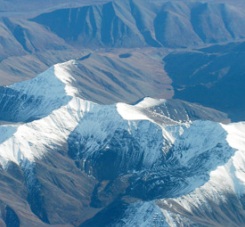By Shastri Ramachandran* | IDN-InDepth NewsAnalysis
NEW DELHI (IDN) – Even as most Indians continue to rue that, in recent months, the government has achieved little on the foreign front, New Delhi has scored a diplomatic victory by joining the Arctic Council as an observer.
India’s accomplishment came at May 15 meeting of the Arctic Council in Kiruna, Sweden. This is a rare instance of diplomatic alertness and activism paying off, thanks to proactive pursuit of a prospect that could have gone awry had the Ministry of External Affairs (MEA) taken things for granted. If the MEA been laid back and assumed that India’s entry in to the Arctic Council would happen as a matter of course, the outcome at Kiruna could have been different.
In the run up to the Council meeting chaired by Swedish Foreign Minister Carl Bildt, Canada – one of the “Arctic Eight” along with Denmark, Sweden, Iceland, Norway, Finland, Russia and the US – had planned to queer the pitch. Authoritative sources confirmed to this writer about Canada making known that it had “bilateral concerns” relating to India. On the eve of the Council’s meeting, the word spread that Ottawa proposed to raise these issues ahead of the move to accord India the status of observer.
However, Canada’s preparatory work to raise a red flag was in vain as none of the Arctic nations were interested in its “bilateral issues”. Canada had gambled on the fact that since India does not enjoy “cordial and normal relations” with Denmark, not only Denmark but Sweden and Norway, too, would line up behind its proposed objections.
Much to Canada’s disappointment, none of the Nordic countries were in the least interested in raising obstacles to India becoming an observer. In fact, although India-Denmark relations are in deep freeze, and Denmark could have played spoiler, it chose not to do so.
Whether this will earn Copenhagen any brownie points with New Delhi is a moot point. It may be recalled that this journalist was the first to report from Copenhagen, in November 2012, of the intensifying race for Arctic resources such as oil and gas, and the case for India to push ahead with finding a place in forums for shaping the future of the Arctic. Since then, New Delhi, aided by inputs from exercises carried out by bodies such as the Institute for Defence Studies and Analysis (IDSA), lobbied hard for a place in the Council.
As observer, India is now in the same league as China, Italy, South Korea, Japan and Singapore. India would now be at the same table as China, which enjoys greater global clout, in parleys on the ownership of the North Pole and formulation of Arctic policy. Unlike New Delhi, which woke up later in the day, Beijing and other global players have long set their sights on the new trade routes that may emerge around the North Pole when the vast oil, gas and mineral reserves in the Arctic could be commercially tapped.
Many countries have pointed out that, in the emerging global order, geography cannot be the sole determinant of access to common resources. China, which is projecting itself also as an Arctic power, is a forceful advocate of the South Pole Principle – access to all, but ownership control to none in Antarctica – for the Arctic Ocean, too.
Foreign Minister Salman Khurshid deserves at least two cheers for his efforts to ensure India’s arrival in the Arctic Council. Since the ASEM (Asia-Europe Meeting) summit in Laos (November 5-6, 2012), where India’s mandarins worked on the Nordic nations, the MEA kept at it. The clincher was, perhaps, Khurshid’s talks with Carl Bildt at the ‘Heart of Asia’ conference in Kazakhstan in April 2013.
*The author is an independent political and foreign affairs commentator. A version of this article appeared in DNA on May 21 and is published here by arrangement with the writer. [IDN-InDepthNews – May 27, 2013]
2013 IDN-InDepthNews | Analysis That Matters
Shastri Ramachandran’s previous articles at IDN:
http://www.indepthnews.info/index.php/search?searchword=shastri%20ramachndran&ordering=newest&searchphrase=any
Related IDN articles:
http://www.indepthnews.info/index.php/global-issues/1588-uncertainty-about-canadas-arctic-vision
http://www.indepthnews.info/index.php/global-issues/869-why-the-arctic-is-a-risky-bonanza
Image credit: Scientific American
Send your comment | Subscribe to IDN newsletter
Follow us on Twitter and Facebook:
http://twitter.com/InDepthNews
http://www.facebook.com/IDN.GoingDeeper

